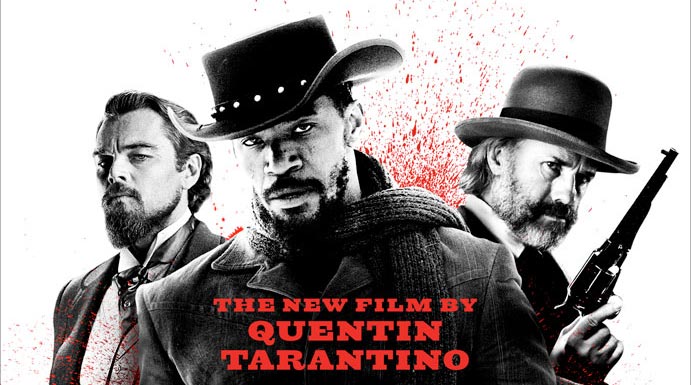 Taking a break from all the end-of-year madness and the fact that the heating is still broken in the house, I went to see Django Unchained last night. This is not a movie review - all I can tell you is I personally had great fun with it. Tarantino once again knows what he is doing, and he is pulling all the stops. Fair warning: in this one, violence is the answer, and it feels sinfully justified. You just want to dunk Leo's head in a toilet anyway.
Taking a break from all the end-of-year madness and the fact that the heating is still broken in the house, I went to see Django Unchained last night. This is not a movie review - all I can tell you is I personally had great fun with it. Tarantino once again knows what he is doing, and he is pulling all the stops. Fair warning: in this one, violence is the answer, and it feels sinfully justified. You just want to dunk Leo's head in a toilet anyway. Here be SPOILERS.
I just wanted to make a short post about the role of storytelling in the movie. Because there is storytelling in the movie, and not just in the film studies "getting the plot across" sense of the word either. Cristoph Watz makes a wonderful job of telling a campfire-side version of the story of Brünhilde and Siegfried from the Niebelungenlied (*insert heart throb here*). That would be worth a blog post alone, but the movie goes way beyond that: they make a point of showing why that story is directly relevant to the plot of the film.
For one, and this is fairly obvious, the lady in need of rescuing was named by her slave-owners after Brünhilde (she also speaks full frontal German, on screen, good Tarantino style). As the good doctor-slash-bounty-hunter explais, Django's story echoes Siegfried and Brünhilde's - he has to "climb the mountain, fight the dragon and cross the hellfire" to rescue his love (luckily for them, the metaphor ends here, and the storyteller spares his audience the bloody-gory end result of the original legend... well, gory for the heroes, anyway, there is plenty of gore left in the movie for the bad guys).
The other point of relevance is that the good doctor, when asked why he is helping a slave to rescue his wife, brings up the story as a reason: as a German, he says, he feels obliged to aid a hero trying to save his Brünhilde. (*insert sqealing part-German storyteller in the audience here*) In this form, the old story (and the telling thereof) plays a very direct role in the movie plot. Also highlights why stories are important and relevant and all the stuff storytellers work hard to remind people of.
Nice work, Mr. Tarantino.
Another nugget that I caught: at one point in the movie, the doctor compares Django to a "soaring eagle" that is superior to chicken. This is nice as it is, as a metaphor, but storytellers will know there is a story behind it, connected to flight and freedom: The Eagle who thought he was a chicken. I personally have heard it in the masterful telling of Antonio Rocha, and also the delightful adaptation of Brenda White Wright at the JC Umoja festival (complete with singing!). Both of them tell it with a much happier ending. Not many people will catch that reference, but it made me smile all the same.








No comments:
Post a Comment